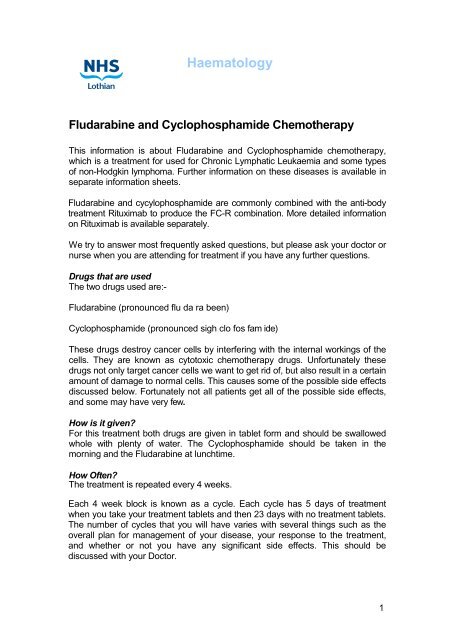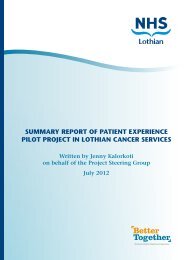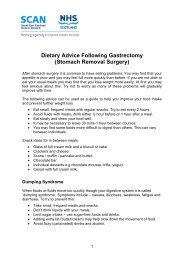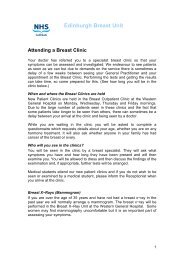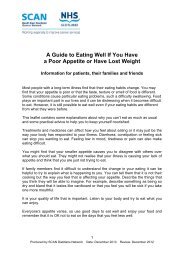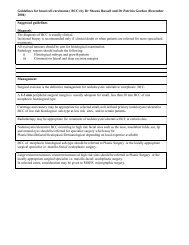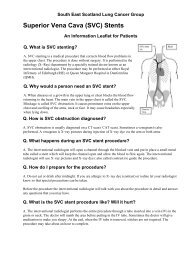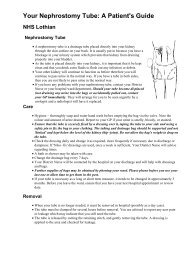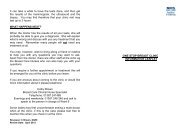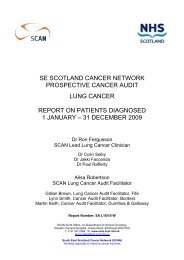Fludarabine and Cyclophosphamide - SCAN
Fludarabine and Cyclophosphamide - SCAN
Fludarabine and Cyclophosphamide - SCAN
Create successful ePaper yourself
Turn your PDF publications into a flip-book with our unique Google optimized e-Paper software.
Haematology<br />
<strong>Fludarabine</strong> <strong>and</strong> <strong>Cyclophosphamide</strong> Chemotherapy<br />
This information is about <strong>Fludarabine</strong> <strong>and</strong> <strong>Cyclophosphamide</strong> chemotherapy,<br />
which is a treatment for used for Chronic Lymphatic Leukaemia <strong>and</strong> some types<br />
of non-Hodgkin lymphoma. Further information on these diseases is available in<br />
separate information sheets.<br />
<strong>Fludarabine</strong> <strong>and</strong> cycylophosphamide are commonly combined with the anti-body<br />
treatment Rituximab to produce the FC-R combination. More detailed information<br />
on Rituximab is available separately.<br />
We try to answer most frequently asked questions, but please ask your doctor or<br />
nurse when you are attending for treatment if you have any further questions.<br />
Drugs that are used<br />
The two drugs used are:-<br />
<strong>Fludarabine</strong> (pronounced flu da ra been)<br />
<strong>Cyclophosphamide</strong> (pronounced sigh clo fos fam ide)<br />
These drugs destroy cancer cells by interfering with the internal workings of the<br />
cells. They are known as cytotoxic chemotherapy drugs. Unfortunately these<br />
drugs not only target cancer cells we want to get rid of, but also result in a certain<br />
amount of damage to normal cells. This causes some of the possible side effects<br />
discussed below. Fortunately not all patients get all of the possible side effects,<br />
<strong>and</strong> some may have very few.<br />
How is it given?<br />
For this treatment both drugs are given in tablet form <strong>and</strong> should be swallowed<br />
whole with plenty of water. The <strong>Cyclophosphamide</strong> should be taken in the<br />
morning <strong>and</strong> the <strong>Fludarabine</strong> at lunchtime.<br />
How Often?<br />
The treatment is repeated every 4 weeks.<br />
Each 4 week block is known as a cycle. Each cycle has 5 days of treatment<br />
when you take your treatment tablets <strong>and</strong> then 23 days with no treatment tablets.<br />
The number of cycles that you will have varies with several things such as the<br />
overall plan for management of your disease, your response to the treatment,<br />
<strong>and</strong> whether or not you have any significant side effects. This should be<br />
discussed with your Doctor.<br />
1
Possible side effects<br />
Each person's reaction to chemotherapy is unique. Some people have very few<br />
side effects while others may experience more. The side effects described here<br />
will not affect everyone who is having <strong>Fludarabine</strong> <strong>and</strong> <strong>Cyclophosphamide</strong><br />
chemotherapy. We have outlined the most common side effects that may occur,<br />
but have not included those that are rare <strong>and</strong> therefore unlikely to affect you. If<br />
you do notice any effects that you think may be due to your treatment but are not<br />
listed here, please let your Doctor or Nurse know.<br />
Lowered resistance to infection<br />
<strong>Cyclophosphamide</strong> <strong>and</strong> <strong>Fludarabine</strong> can reduce the production of white blood<br />
cells by the bone marrow, making you more prone to infection. This effect may<br />
begin about 4 days into each treatment cycle, reaches its maximum at 10 - 14<br />
days <strong>and</strong> then slowly recovers to normal as your next treatment cycle is due to<br />
begin. You must contact us immediately if:<br />
• Your temperature is above 38 ° C on 2 occasions one hour apart<br />
• Your temperature is above 38.5 ° C at any time<br />
• You suddenly feel unwell, even with a normal temperature.<br />
While your immunity is low, you cannot fight infection very well yourself<br />
<strong>and</strong> what would usually be minor infections can become serious <strong>and</strong> in<br />
some cases life threatening if they are not treated promptly.<br />
Because you will be at increased risk of developing some chest infections, you<br />
will be prescribed an antibiotic called Cotrimoxazole (also known as Septrin) to<br />
be taken 3 days a week. This antibiotic will continue for 6 months after you have<br />
finished treatment with <strong>Fludarabine</strong>, <strong>and</strong> reduces the risk of developing these<br />
chest infections. You will have a blood test before each cycle of chemotherapy to<br />
make sure that your bone marrow cells have recovered. Occasionally it may be<br />
necessary to delay your treatment if your blood count is too low.<br />
Bruising or bleeding<br />
<strong>Cyclophosphamide</strong> <strong>and</strong> <strong>Fludarabine</strong> can reduce the production of blood cells<br />
known as platelets that help the blood to clot normally. Let us know if you have<br />
any unexplained bruising or bleeding. If the platelet count has become low you<br />
may need to have a transfusion of platelets.<br />
Anaemia<br />
<strong>Cyclophosphamide</strong> <strong>and</strong> <strong>Fludarabine</strong> can reduce the number of red cells in the<br />
blood. This is known as anaemia <strong>and</strong> may make you feel tired <strong>and</strong> breathless. A<br />
blood transfusion may occasionally be needed to correct this. If you need to<br />
have a blood transfusion you will be given specially treated irradiated blood. This<br />
is because <strong>Fludarabine</strong> treatment makes you more likely to have a reaction with<br />
transfused blood products <strong>and</strong> this treatment reduces the risk.<br />
2
Feeling sick (nausea) <strong>and</strong> vomiting<br />
With these tablets at these doses nausea <strong>and</strong> vomiting is fortunately not<br />
common. It may however be a problem for some people, so you will be given a<br />
supply of anti sickness drugs to take if you need to.<br />
Fever, chills <strong>and</strong> joint pain<br />
May occur shortly after taking these medicines, but do not usually last long. You<br />
may be prescribed medicines to reduce these if it is a problem.<br />
Raised levels of Uric acid in the blood<br />
A drug called Allopurinol may be given to stop this happening, as high urate<br />
levels in the blood can result in gout <strong>and</strong> rarely kidney damage. It may also help<br />
to drink plenty of fluids.<br />
Changes in eyesight, headaches <strong>and</strong> confusion, weakness or agitation<br />
These occasionally may happen with <strong>Fludarabine</strong>. Report to your Doctor straight<br />
away if this happens.<br />
Changes to the lungs<br />
Both of these drugs may rarely cause some changes to the lung tissues. This is<br />
more likely to happen if you smoke. Let us know if you notice a cough or<br />
increased breathlessness.<br />
Your liver may be temporarily affected<br />
Both of these drugs may cause changes in the way that your liver works, but it<br />
will return to normal when treatment is finished. Your liver tests will be monitored<br />
closely during your treatment.<br />
Changes in the way your heart works<br />
This is very uncommon with the doses of <strong>Cyclophosphamide</strong> that are usually<br />
used, but can occasionally happen when high doses are used. If you have any<br />
other risk factors, tests to see how well your heart is working may be carried out<br />
before you start treatment.<br />
Tiredness<br />
Many people feel tired (fatigued) during chemotherapy, particularly towards the<br />
end of treatment. This is a very common side effect <strong>and</strong> it is important to try <strong>and</strong><br />
get as much rest as you need.<br />
Hair loss<br />
There may be some hair loss or thinning with this treatment, but often it is not<br />
severe. This usually starts about 3-4 weeks after your first treatment. As well as<br />
scalp hair loss, you may have thinning or loss of eyebrows, eyelashes <strong>and</strong> other<br />
body hair. This is temporary <strong>and</strong> your hair will start to grow again once your<br />
treatment is finished. If hair loss is significant then speak to your nurse who will<br />
give you information about a wig.<br />
3
Sore mouth<br />
Your mouth may become sore or dry, or you may develop small ulcers during<br />
this treatment. Drink plenty of fluids <strong>and</strong> clean teeth regularly <strong>and</strong> gently with a<br />
soft toothbrush to help reduce the risk of this happening. Tell your nurse if you<br />
have a problem with a sore mouth. You may be given mouthwashes or<br />
medicines to prevent or treat mouth soreness <strong>and</strong> ulcers.<br />
Taste<br />
You may notice that your food tastes different, but normal taste will return once<br />
your treatment is finished.<br />
Irritation of the bladder<br />
It is important to drink plenty of fluids to minimise this. If you notice any blood in<br />
your urine or pain on passing urine, tell your Doctor or Nurse.<br />
Diarrhoea<br />
This may occasionally be a problem, but can usually be easily controlled with<br />
medicines. Let us know if it is severe or persistent. It is important to drink plenty<br />
of fluids (at least 2 or 3 litres a day) to replace those that you are losing.<br />
Skin changes<br />
During treatment <strong>and</strong> for several months afterwards you will be more sensitive to<br />
the sun <strong>and</strong> your skin will burn more easily than usual. You can still go out in the<br />
sun but wear a high protection factor sun cream <strong>and</strong> cover up with clothes.<br />
Rarely your skin may darken during treatment. If it does it will usually return to<br />
normal over a few months once treatment is completed.<br />
Many people find that their skin becomes drier than usual during treatment.<br />
Simple moisturising creams can help this. <strong>Fludarabine</strong> may cause a rash that<br />
may be itchy. Let us know if this happens as prescription of antihistamines may<br />
help.<br />
Nail changes<br />
Your nails may become darker <strong>and</strong> white lines may appear on them. They may<br />
also become dry. These changes grow out with the nails over a few months<br />
once treatment is finished.<br />
Additional information<br />
Some medicines can be harmful to take when you are having chemotherapy. Let<br />
your doctor know about any medicines you are taking, including non-prescribed<br />
drugs such as complementary therapies <strong>and</strong> herbal drugs.<br />
Fertility<br />
Your ability to become pregnant or father a child may be affected by this<br />
treatment. It is important to discuss this with your doctor before starting treatment<br />
if this is of concern to you.<br />
4
Contraception<br />
It is not advisable to become pregnant or father a child while having this<br />
treatment as the developing baby may be harmed. It is important to use effective<br />
contraception while taking these drugs, <strong>and</strong> for at least 6 months afterwards, <strong>and</strong><br />
it may be advisable to delay starting a family for about 12 months after your<br />
treatment to make sure that you are fully recovered. Discuss this with your nurse<br />
or doctor if you have any concerns.<br />
Loss of periods in women<br />
Due to the effect of chemotherapy on the ovaries you may find that your periods<br />
become irregular or stop. In younger women this is often temporary but if you are<br />
closer to your menopause it may be permanent. This will result in menopausal<br />
symptoms such as hot flushes <strong>and</strong> sweats <strong>and</strong> vaginal dryness.<br />
Second cancers<br />
For people treated with chemotherapy there is a small increase in the risk of<br />
developing other cancers at a later date. With this treatment this risk is very low<br />
<strong>and</strong> after about 10 years falls back towards the background risk shared by the<br />
whole population.<br />
Reviewer: Dr John Davies<br />
Review Date: April 2012<br />
5


